 Petzlover
Petzlover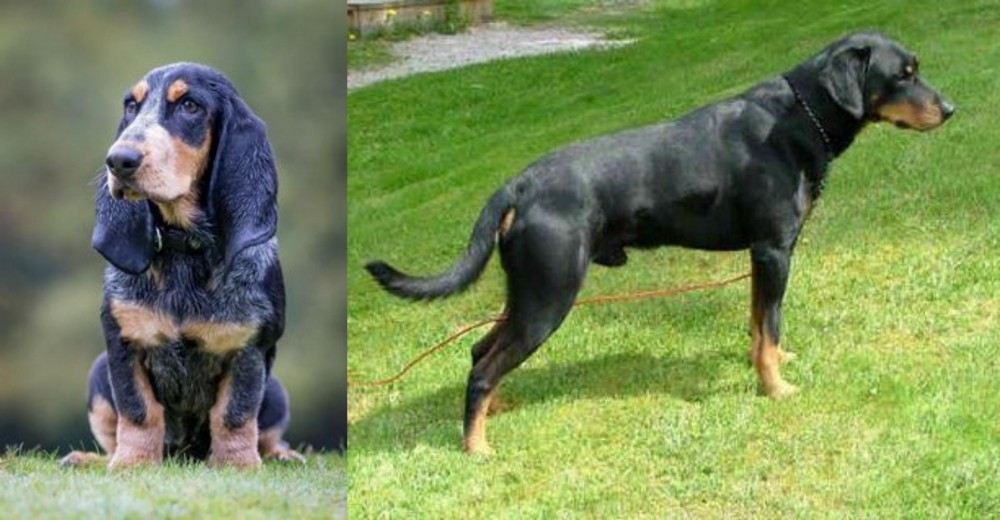 Petit Bleu de Gascogne is originated from France but Smalandsstovare is originated from Sweden. Both Petit Bleu de Gascogne and Smalandsstovare are having almost same height. Both Petit Bleu de Gascogne and Smalandsstovare are having almost same weight. Both Petit Bleu de Gascogne and Smalandsstovare has almost same life span. Both Petit Bleu de Gascogne and Smalandsstovare has almost same litter size. Both Petit Bleu de Gascogne and Smalandsstovare requires Low Maintenance.
Petit Bleu de Gascogne is originated from France but Smalandsstovare is originated from Sweden. Both Petit Bleu de Gascogne and Smalandsstovare are having almost same height. Both Petit Bleu de Gascogne and Smalandsstovare are having almost same weight. Both Petit Bleu de Gascogne and Smalandsstovare has almost same life span. Both Petit Bleu de Gascogne and Smalandsstovare has almost same litter size. Both Petit Bleu de Gascogne and Smalandsstovare requires Low Maintenance.
 The Petit Bleu de Gascogne is a scenthound dog originating in France where he has always been used as a hunting dog.
The Petit Bleu de Gascogne is a scenthound dog originating in France where he has always been used as a hunting dog.
The Petit Bleu de Gascogne is a descendant of the Grand Bleu de Gascogne. This dog was developed around the 16th century already, with the numbers of the dog being reduced at the time of the World Wars.
They’re quite well known in France, but not in any other parts of the world. The dog is an official member of the UKC, and it was in 1991 that the dog joined their scent hound group.
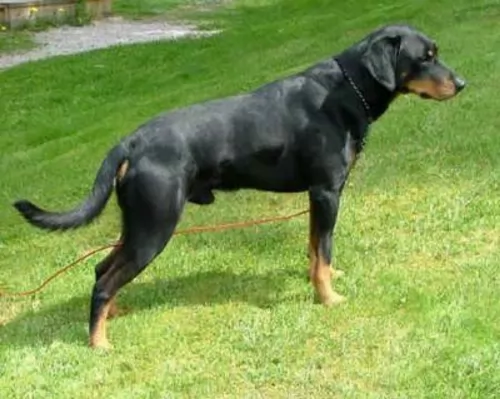 The Smålandsstövare has got quite a long history and dates back to the 1600s. He is the smallest of the Swedish hound breeds. This is a scenthound.
The Smålandsstövare has got quite a long history and dates back to the 1600s. He is the smallest of the Swedish hound breeds. This is a scenthound.
Hounds similar to the Smålandsstövare were bred with European hounds and then brought to Småland and bred with local spitz-type farm dogs to create the foundation stock for the Smålandsstövare.
The dog was used to hunt but nearly died out in the 20th century, but breeders restored it and the first official standard emerged by the Swedish Kennel Club in 1921.
The Smålandsstövare is a rare dog breed but it is recognized by the American Rare Breed Association as well as other major kennel clubs, one of which is the Federation Cynologique Internationale as well as the United Kennel Club.
 The Petit Bleu de Gascogne is a medium to large sized dog which stands at between 52 to 58cm in height at the withers and weighs in the region of 18 to 22kg.
The Petit Bleu de Gascogne is a medium to large sized dog which stands at between 52 to 58cm in height at the withers and weighs in the region of 18 to 22kg.
In fact, the only difference between the Petit Bleu de Gascogne and the original Bleu de Gascogne is its size. They’re well proportioned dogs and they have lean, muscular bodies. The head is long and slim, the nose black, the expression gentle and unthreatening.
Most times you’ll find a black patch on each side of the head which extends to the ears so that the ears are essentially black. The patch also extends to around the eyes.
The dense, short coat is a typical trademark feature, with the color of the coat being white mottled with black so that the general appearance is a slate blue color. The dog usually has tan eyebrows over each eye. The tail is long and the ears long and floppy.
Kept essentially as a pet today, the Petit Bleu de Gascogne has kept its hunting instincts and is an excellent scent-dog, being able to follow a scent for miles. It is why you want to ensure that as a pet, you take him on regular walks, every day in fact. He just loves to get out, and given the chance to run and chase a scent.
Apart from his hunting skills, he still makes an excellent pet, being loyal and loving with his human family. He is looked upon as being amicable and well-balanced, getting on well with children as well as dogs in the home.
They’re quite laid-back and friendly, so they don’t make particularly good watchdogs. They are independent and intelligent and will respond well to training and socialization.
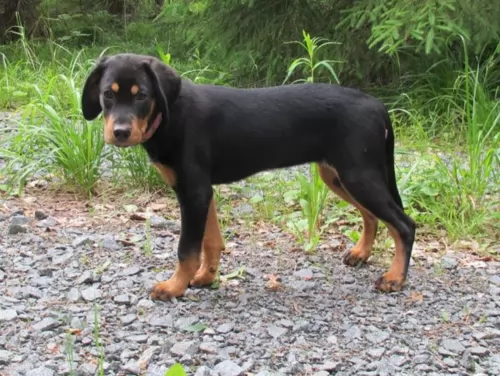 The Smålandsstövare is a muscled, compact looking dog. The double coat is shortish to medium length and is thick and quite coarse to the touch. He sheds seasonally. The coat is usually black with tan markings.
The Smålandsstövare is a muscled, compact looking dog. The double coat is shortish to medium length and is thick and quite coarse to the touch. He sheds seasonally. The coat is usually black with tan markings.
The high set ears are medium length and floppy, the head is slim and the tail can be naturally short. Sometimes the tail is long and can be slightly curved in the spitz-like sabre fashion.
The eyes are brown and friendly. The height of these dogs is about 46 to 54cm and he weighs anything from 15 to 18kg.
Usually a well behaved, quiet, calm, gentle dog, the Smålandsstövare takes his role as guard dog seriously, wanting to protect his family.
His good temperament ensures he gets on well with all members of the family. He is full of energy and will need to be exercised well, whether it be ball games in the garden, a walk around the block, a run in the park or joining his family on hikes and camping trips.
It is why he won’t settle down well on a small property in the city. He needs larger premises to expend his energy, and if in cramped premises without exercise, he may resort to barking and whining and this may well drive your neighbors bats.
Training and socializing your Smålandsstövare will be necessary and it should be easy as he is intelligent.
 The Petit Bleu de Gascogne just loves being outdoors, chasing the scent of something interesting. He is in his element outside as a hunting or tracking dog.
The Petit Bleu de Gascogne just loves being outdoors, chasing the scent of something interesting. He is in his element outside as a hunting or tracking dog.
Training and socialization will always be a good idea for these dogs, as once on the scent he may be inclined to ignore your calls and not return easily.
They’re easy-going dogs, loving be around their human family. Provide well for him and you will find that he makes an amicable, loyal and devoted companion.
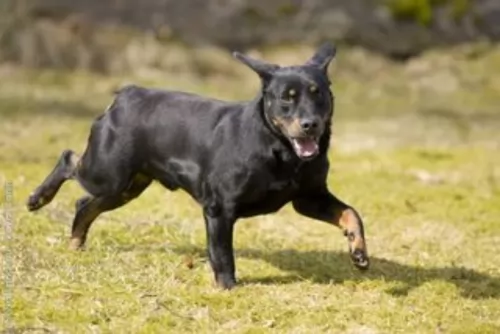 The Smålandsstövare is a robust dog with a lot of stamina. He will be wanting a lot of exercise and is ideal as a pet in the suburbs or the countryside but not ideal for city living.
The Smålandsstövare is a robust dog with a lot of stamina. He will be wanting a lot of exercise and is ideal as a pet in the suburbs or the countryside but not ideal for city living.
He makes a wonderful family pet, forming strong bonds with his owners. He makes an excellent watchdog too wanting to protect his family, and with this amicable, calm dog, you’re going to have a true friend.
 The Petit Bleu de Gascogne is a healthy dog with no unusual health problems being documented. With good care, he can generally live to be 11, 12 or 13 years of age. Nonetheless it is a good idea to be aware of some of the horrible dog illnesses that can strike, even though it is highly unlikely.
The Petit Bleu de Gascogne is a healthy dog with no unusual health problems being documented. With good care, he can generally live to be 11, 12 or 13 years of age. Nonetheless it is a good idea to be aware of some of the horrible dog illnesses that can strike, even though it is highly unlikely.
Your Petit Bleu de Gascogne is a deep chested dog and this simply means it can develop bloat. A swollen stomach, lethargy and trying to vomit are just some of the signs of this ailment which can become deadly if not attended to. The stomach can twist with bloat and this is when things get serious.
Floppy eared dogs are always at risk of ear infections and these can be painful for your pet. You will notice him scratching at his ears or shaking his head and then its time to investigate further for redness or discharge.
 The Smålandsstövare is a rare dog breed and not much is known about congenital conditions to which he may be particularly prone.
The Smålandsstövare is a rare dog breed and not much is known about congenital conditions to which he may be particularly prone.
With good care he can reach 14 or 15 years of age. The floppy ears put him at risk for ear infections, while other conditions to watch for include hip dysplasia, cancer, bloat and obesity.
If you see your dog shaking his head or pawing at his ears, look inside because the ears may be red and inflamed. It is important to get help quickly for ear problems in dogs.
Ear canals are sensitive so if you don’t want to clean the ear and work on it yourself it is important to get your pet to the vet. The vet will clean your dog’s ears and also prescribe antibiotics.
For future treatment, you will need to clean your dog’s ears and keep them dry. If you don’t want to do this yourself, make sure to get him to professional groomers who will do this for you.
 Luckily the Petit Bleu de Gascogne is a fairly low maintenance dog who will basically require a good brush twice a week to rid him of loose hairs and to keep his coat nice and shiny.
Luckily the Petit Bleu de Gascogne is a fairly low maintenance dog who will basically require a good brush twice a week to rid him of loose hairs and to keep his coat nice and shiny.
Take the time while brushing him to test for any unusual lumps on his body. Check inside his ears too, because as a floppy eared dog, there can be a build-up of wax, debris and dampness and these can all cause bacteria and an ear infection.
Check his eyes too as well as inside his mouth. He can’t tell you when he’s got terrible tooth ache from a rotting tooth and you need to check for this. Bad teeth can cause all kinds of health issues.
There are some excellent commercially manufactured dog foods on the market which have got the vitamins and minerals your pet needs. Some of the lower quality foods have got bad ingredients such as colorants and fillers and these can actually be toxic for your pet.
It’s always wise to add a little bit of home-made food into your pet’s diet and then simple, nutritious foods such as boiled chicken, brown rice or pasta, sweet potatoes, carrots and spinach can do him the world of good. Just chop it up and add it into the dried kibble every other night when you feed your pet. A bit of raw meat occasionally can also be healthy for him.
Always ensure there’s a bowl of fresh, cool water available to him.
Ensure your pet has a nice comfortable, dry place to sleep.
Never ever leave your pet alone in a hot car.
Make sure your puppy has his puppy vaccines to avoid some life-threatening diseases.
Have your dog spayed or neutered to avoid unwanted puppies.
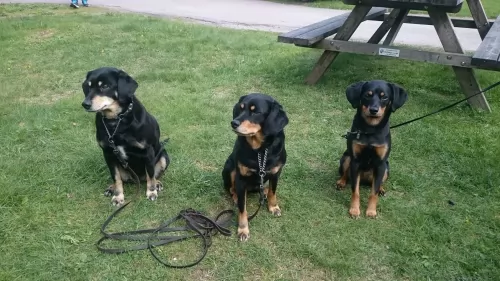 Choosing a good diet is imperative for the Smålandsstövare. Choose a commercially manufactured dog food high in vitamins and minerals.
Choosing a good diet is imperative for the Smålandsstövare. Choose a commercially manufactured dog food high in vitamins and minerals.
Give your dog a treat by providing him with some home-made food. It can be added into the dry kibble about twice a week as a treat. Boil brown rice and chicken in a pot and add in sweet potatoes, carrots and spinach. Chop all this up and give it to your dog in small portions. Also try to include some raw meat into the diet.
The Smålandsstövare is a very energetic breed and he is going to require some vigorous exercise every day. Take him for walks, allow him to run with you when you cycle or jog or take him swimming.